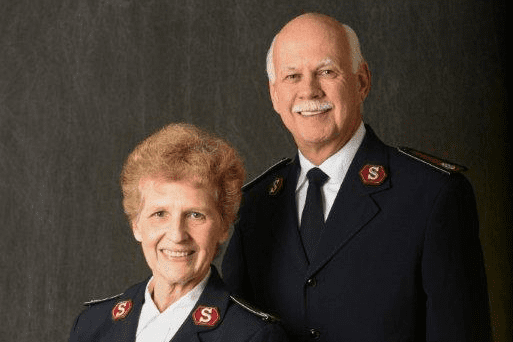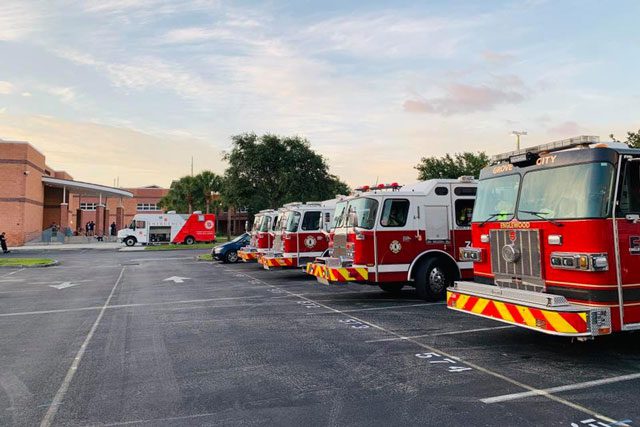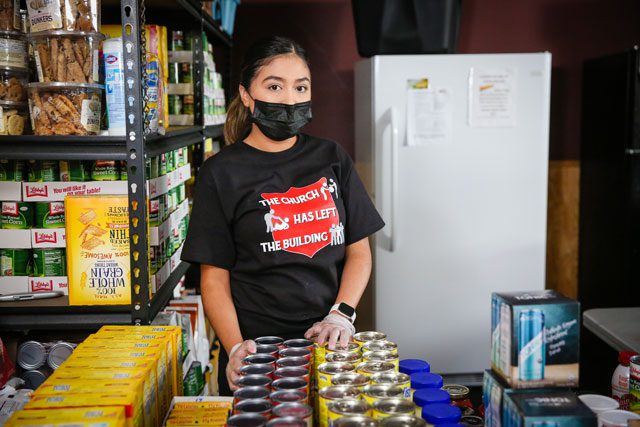Terrorists hit US, Army responds
 Salvation Army personnel staff a canteen in lower Manhattan as workers continue efforts to sift through rubble. Reports indicate Army volunteers provide aid “on every corner.” |
BY SUE SCHUMANN WARNER –
Now, dust and debris swirl around the streets of lower Manhattan and smoke rises from the rubble of the World Trade Towers. Families and friends still hold hope–tenuously–that loved ones may still be alive somewhere, somehow, under the masses of steel and concrete that were the tallest buildings in New York City.
A week after two planes hijacked by terrorists slammed into Towers 1 and 2, Salvation Army officers, soldiers and volunteers continue to provide meals, comfort, and spiritual assistance to scores of relief workers, fire fighters and police officers.
As the days pass, their presence is valued more than ever.
The Army’s relief work began as part of the Greater New York Division’s “Operation Compassion Under Fire,” which has provided more than 430,000 meals from 20 canteens and one mobile kitchen in locations near the World Financial Center and other key sites. Six hundred volunteers and 150 staff have supported the work.
In addition, the New Jersey Division has had two canteens at a triage location in Liberty State Park across the Hudson River as well as two canteens in Jersey City and another at the Meadowlands staging area.
Grief counseling
The Salvation Army has had a team of experienced grief counselors on site at the New York medical examiner’s office since the beginning of Tuesday’s devastating events.
At the specific request of the New York City Police and Fire Departments, the Army has now set up a grief counseling center at the American Express building, located across the street from the site of the World Trade Center.
 A canteen from Northeast Pennsylvania serves rescue workers. |
Major Molly Shotzberger, who was an instrumental part of the Army’s grief counseling team following the crash of TWA #800 in 1996 and who had been counseling at the medical examiner’s office all week, organized the grief counseling center. The team of ten Salvation Army officers has provided on-going counseling and support to victims and their families.
Experienced disaster professionals have welcomed Army help as well. When members of the New York City Fire and Police Departments searched through the rubble of the attack and found strewn body parts, they wanted a counselor to travel with them to the morgue–and enlisted the help of Salvation Army officer Captain Hector Medina.
“Regardless of how seasoned these rescue workers are, nothing can compare to the gut-wrenching devastation we’ve witnessed this week,” said Shotzberger. “We believe having an extra measure of emotional and spiritual support will be the key to getting us all through these dreadful weeks ahead.”
During President George Bush’s recent visit to New York City to view the damage, one of the individuals he greeted was Dr. Norm Raymond, a Salvationist from Ohio, who had volunteered his time as a grief counselor along with two psychiatrist friends. As Bush noticed the red shield on Raymond’s jacket, he warmly shook his hand and gave him a “thumbs up.”
To date, 4,957 are still missing in the attack on New York, with nearly two hundred confirmed dead.
The Pentagon and Pennsylvania crashes
Army personnel and volunteers are assisting at the site of the Pentagon crash, where the hijacked American Airlines Flight 77 killed more than 188 and injured 76. Over 500 meals an hour were served at six different locations to rescue workers, firefighters, military personnel and families with missing members.
The Salvation Army will stay for at least two weeks and has promised to stay “as long as there is need.” In addition, Salvation Army staff and volunteers are providing grief and spiritual counseling to families and co-workers of the victims.
Southwest of Pittsburgh, where United Airlines Flight 93 went down, The Salvation Army was on site, providing meals and support to disaster relief personnel.
Canada
As flights to the U.S. were cancelled and all airports closed, many airplanes en route to American cities were diverted to Canada. At airports across the nation, Salvationists provided assistance to weary travelers.
In St. John’s, Newfoundland, the Army was the first emergency organization on the scene to receive passengers scheduled to arrive on 30 flights. Five hundred seventy-seven passengers were housed and fed in the St. John’s area.
At Gander, Newfoundland, with 40 planes on the tarmac, Army personnel worked round the clock, assisting approximately 10,000 people as they came off the planes. More than 1,100 were housed at Salvation Army centers.
In Dartmouth, the Maritimes, Salvationists coordinated services to passengers of 50 diverted planes, including counseling services to 1,300.
Looking out of the window of the stranded plane and seeing the Salvation Army’s emergency vehicle on the tarmac, one distraught passenger was heard to say, “We’ll be o.k.–The Salvation Army is here.”
USA National Headquarters
“Amidst the terrible feelings of pain, hurt, loss and outrage, it has been heartwarming to receive wonderful messages of support from the General, Chief of the Staff, and other IHQ personnel and territorial leadership from around the world,” said Commissioner John Busby, national commander.
“While the effects of the terrorist attacks have been devastating, the solidarity of the world community as well as our international Salvation Army family has been a means of unifying support.” Busby noted that the Lilly Endowment has given a $10 million gift to The Salvation Army to assist in the relief ministry.
Around the world
On Friday, September 14, Queen Elizabeth, Prince Philip, Prince Charles, Prime Minister Tony Blair and scores of representatives of the London diplomatic scene attended a Service of Remembrance at St. Paul’s Cathedral in London.
Many Salvation Army officers attended, with Commissioner Alex Hughes, UK territorial commander, as the Army’s main representative along with other church dignitaries.
Commissioners Todd and Carol Bassett, American officers serving at IHQ, were included in the special group of Americans selected to meet the official party at the conclusion of the service. The Archbishop of Canterbury, the Most Reverend and Right Honorable George Carey, stopped to talk with the Bassetts, declaring his fondness for the Army and sharing concern and prayers for the people of America.
Also in attendance was Commission-er Carol Saunders.
Other expressions of support for the Army’s relief work have poured in from around the globe:
From Colonel Brian Tuck, Sri Lanka territorial commander, “In this sad time of great desolation and deep grief, please be aware of the love, concern and prayer support of the Salvationists in Sri Lanka for you all and for the nation. We stand strengthened by President Bush’s brave words. At prayers this morning, we sang General Orsborn’s words, ‘help us in the fiery blast,’ and we know he will do just that and minister to you as you seek to minister even in your grief.”
Lt. Colonel Geoff Blurton, Zambia and Malawi Territory chief secretary, wrote on behalf of territorial leaders Commissioners Tadeous and Nikiwe Shipe, “We weep with you; we hurt with you; we pray with you and for you. We serve a great God who will help you as individuals and as a nation.”
“Know that you are in my thoughts as well as the thoughts of the Launceston Corps,” wrote an Army bandsman from Tasmania. “I am praying for you and the people of your city,” was the sentiment of a British Broadcasting producer.
A Salvation Army officer in Merseyside, England, decided to make Sunday morning’s worship service a time of prayer for New Yorkers touched by the tragedy.
A church in Canada was prepared to send as many as 40 volunteers to counsel, serve food, ANYTHING, to help out in the relief efforts while taking care of their own housing.
“We are overwhelmed by the support shown by people from all over the world,” said Major Carl Schoch, Greater New York divisional commander.
Phone support
Across the nation, callers have been able to ask for prayer, volunteer money, goods or services, or receive counseling by calling 1-800-SAL-ARMY. Each U.S. territory, except the Eastern, has taken turns manning 24-hour phone lines for “Operation We Care.”
According to Tom McSherry, western emergency disaster services coordinator, on September 13 and 14 alone more than 42,000 calls were taken by Salvationists across the nation. The West is responsible for the 7 p.m. to 4 a.m. calls and has 12 phone lines.
“The Salvation Army continues to find ways to meet human need at the point of need,” said Captain Bob Rudd, community relations and development secretary. “Callers from around the country are speaking with caring TSA representatives on a 24-hour basis to secure emotional and spiritual support, offer their volunteer services and make personal prayer requests.”
Tom McSherry, Warren L. Maye, and Craig Evans contributed to this story











